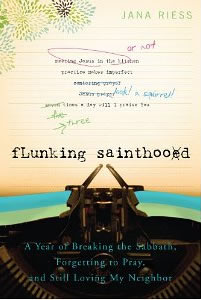Book Notes
 Jana Riess, Flunking Sainthood; A Year of Breaking the Sabbath, Forgetting to Pray, and Still Loving My Neighbor (Brewster, MA: Paraclete Press, 2011), 182pp.
Jana Riess, Flunking Sainthood; A Year of Breaking the Sabbath, Forgetting to Pray, and Still Loving My Neighbor (Brewster, MA: Paraclete Press, 2011), 182pp.
We hear a lot today about the "spiritual disciplines," the effect of which, I suspect, is to make the Christian life feel like a very serious endeavor. Jana Riess's contribution to this burgeoning literature takes a different tack. She decided not only to read about the spiritual disciplines but also to practice them. So for a period of one year, each month she read a spiritual classic and practiced the corresponding discipline. Her whimsical memoir is predicated upon self-effacing humor at her abject failure in most everything she tried.
After an initial chapter that explains how she took the first month to map her year of reading and practices, the remainder of the book devotes one chapter to each month and its discipline: fasting from sun up to sun down (cf. Ramadan), mindfulness of God's presence (Brother Lawrence), lectio divina (Eugene Peterson), simplicity and no shopping (Richard Foster), centering prayer (Charles Keating), Sabbath-keeping (Abraham Heschel), gratitude, hospitality (the Rule of St. Benedict), vegetarianism (St. Francis), fixed-time prayer (Phyllis Tickle), and generosity.
Riess describes how she bombed at all these disciplines. At the end of the book she acknowledges how artificial and presumptuous it was to think she could learn a difficult practice in a single month, to practice these disciplines alone instead of in community, and to do them without the help of a guide. She also learned a lot about exterior practices and interior motivations, about the letter of the law and its spirit. She experienced discouragements, confusions and questions. But in a short concluding chapter about visiting her dying father who had abandoned the family long ago, she discovers that she had actually changed a little that year. In the end she embraces a spirituality of imperfection, or what she calls the "wild acceptability of failure itself."


